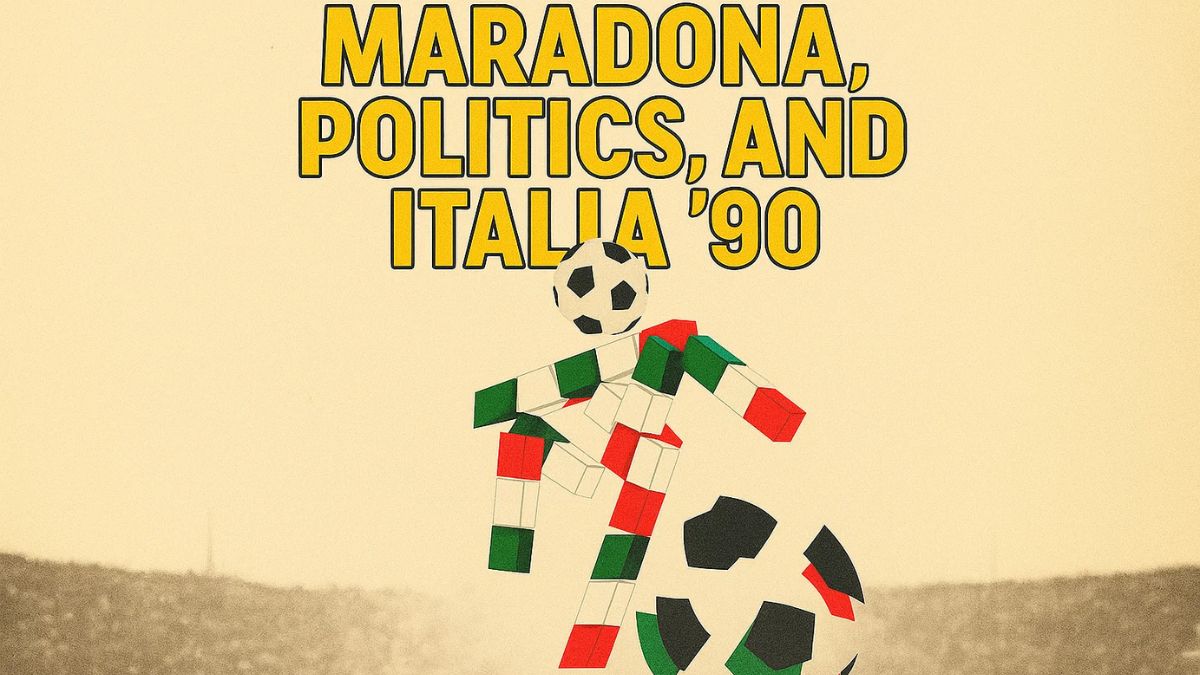
The 1990 FIFA World Cup in Italy was more than a tournament. It was a stage where Italy’s north–south divide, its political corruption, and even the Cold War found expression. From Sardinia’s tight policing of English fans to Maradona’s provocation in Naples, the matches became political theatre.
Hosting the Cup cost Italy dearly. The government and organizers poured billions of lire into new builds like Turin’s Stadio delle Alpi and Bari’s San Nicola, along with costly renovations across the peninsula. By the end, the bill sat around $4.3 billion, with projects plagued by delays, corruption, and even deadly accidents. Delle Alpi quickly became the symbol of a poor legacy, outdated within years and eventually demolished.
Internationally, Italy hoped Italia ’90 would project unity and competence. Instead, the tournament often highlighted fracture. Stadiums were spread across the map, from Udine to Bari, even Palermo and Cagliari, to appease regional pride. Politics shaped these choices as much as football logic. In Palermo, rushed works at La Favorita caused a roof collapse that killed five workers.
In Sardinia, England’s entire group stage was staged in Cagliari, a deliberate move to ring-fence notorious English hooligans. Thousands of police patrolled, alcohol sales were restricted, and when violence flared, Italian authorities expelled offenders within hours. The tactic largely worked, but Cagliari became shorthand for heavy policing more than sport.
How stadium choices, crowds, and security turned games into politics
No game carried more symbolism than Italy–Argentina in Naples. Diego Maradona, beloved at Napoli, openly challenged the national narrative before the semi-final. “I don’t like the fact that now everyone is asking the Neapolitans to be Italian and to support their national team. Naples has always been marginalised by the rest of Italy. It is a city that suffers the most unfair racism,” he told reporters. He reminded Neapolitans that they were treated as outsiders 364 days a year, only to be asked for loyalty on the 365th.
Inside the San Paolo, loyalties were torn. A banner read, “Maradona nei cuori, l’Italia nei cori” — Maradona in our hearts, Italy in our chants. Many applauded Argentina’s anthem, a first that tournament, and when Maradona scored his penalty in the shootout, sections of the curva cheered. Italy lost, and the backlash was fierce. Northern media accused Naples of betrayal. Juventus president Giampiero Boniperti said he “could never have imagined that the people of Naples would stop supporting Italy,” and the Lega Nord seized on it as proof southerners weren’t truly Italian. Naples defended itself, pointing to flags draped across the city and headlines declaring “Napoli è sempre italiana.” The match left an open wound, deepening the north–south divide.
In Turin, the other semi-final played out as a calmer foil. England and West Germany fought to penalties, with West Germany winning. Italians largely supported the Germans, partly from relief at avoiding an English invasion of Rome and partly from European camaraderie. England’s Paul Gascoigne wept after a booking that would have suspended him from the final, an image that softened English football’s reputation abroad and at home. For Italy, the Turin night was a reminder of sport without betrayal; for Germany, it was a stepping stone to history.
The final in Rome pulled the threads together. Italy was absent, but its crowd roared with politics. When Argentina’s anthem played, whistles drowned it out. Maradona cursed into the cameras. Argentina’s players felt they were playing against 80,000 Italians, not just West Germany. The Germans won 1–0, lifting the trophy less than four months before reunification. It was the last hurrah for West Germany and the final World Cup appearance for the USSR, whose early exit mirrored its political unraveling. Italia ’90 closed the Cold War’s football chapter on Italian soil.
For Italians, the tournament lives as both magic and fracture. Songs like “Notti Magiche” still echo, but so does the memory of a stadium jeering its own anthem, of stadiums that aged fast and paid back little, and of politics intruding on every match. Italia ’90 was football, but it was also Italy, revealed in full view of the world.